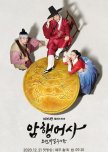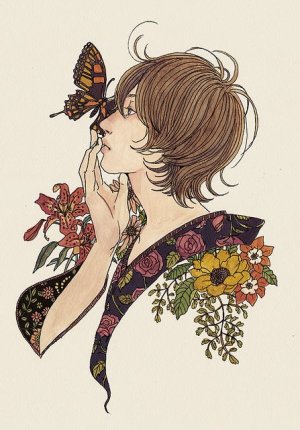
Brilliant
Apparently this was shot on location in the far Northwest, in 90 days, last autumn while the pandemic was still going strong. We already know how much magic a terrific cast can infuse a crappy script with power (I'm looking at you, Guardian), but when the script is as brilliant as the actors, you get sheer magic.The production company is known for some outstanding shows, Nirvana in Fire being one. They seem drawn to stories of heroism in increasingly realistic settings, a combination I find bewitching. The story concerns a dirt-poor village being resettled in the Gobi desert, which is in the process of being converted to arable land.
For me, the best part of Like a Flowing River, which I also loved, was the story of a small town as they went from virtual medieval backwardness, imposed by the Cultural Revolution, into the modernity of the eighties. In a way it seems to have been practice for this series, which nominally centers around the Ma family, but everyone is important. We get the lives of teens, and middle-aged people, and elderly. Men and women.
It's clear that this series was produced for the upcoming political celebration, with its uplifting message extolling hard work and integrity, but the substrate is a reminder of the inimical aftereffects of corrupt government officials. It is all demonstrated through small, entirely human stories, filled with tragic and triumph, love and sacrifice, joy and celebration, with a steadying thread of irony.
If I had any complaints it would be the very tightness of the story, that leaves certain emotional changes to the imagination. There is a lot of story conveyed in 23 episodes, over twenty years of time. I think--I wish--that it had been 25, or even 30 episodes. But we have what we have, containing many exquisite moments of perfect characterization begging rewatch. I can't say enough about every single performance, even people with no more than half a dozen lines (like a certain person's disabled husband). Sandwiched between two really lovely pieces of music.
Cet avis était-il utile?

Held in the Lonely Castle
22 personnes ont trouvé cette critique utile
The fictional storyline (the Liang merchant family in specific) and the historical framework are brilliantly woven together; at first they seem to be two different stories, but eventually are brought together for sublime, and emotionally devastating effect.
Viewers who like the easy emotional shortcuts of romances, the popular BL stories especially (where the plot illogic wrenches the characters, and all sense, into alignment with maximum angst and hurt/comfort). Angst there is here, and also hurt/comfort, but these elements don't bend the story, but arise out of it, interspersed with insight, comic moments, intellectually exciting threads as we watch the politicians striving to invent, and better, their land.
The cultural differences between then and now add their interest, but the film never loses sight of the fact that we are all human beings, a thousand years ago and now, and we have roughly the same emotional needs, faults, frailties, and strengths.
Even the characters I strongly disliked had their agency, their reasons for what they did, and their human moments, even positive moments of creating beauty, or heroic action, or emotional faltering. The resolution of one long arc was amazing in its redemptive quality, taking me by surprise--I expected (even relished the thought of) the usual bloody end. But the way this was carried out was just so much better than the usual tropey story arcs.
I see myself rewatching the entire series again, probably soon, something I have only done with NIRVANA IN FIRE, this time to relish the brilliant character moments and the way they are expertly woven together.
I have watched all Daylight's shows. I think this is their best yet.
Cet avis était-il utile?

Great . . . ish
Because of the meticulousness of the social interactions and the ins and outs of court life, ritual and rites, and the various strata of society with which this complicated series was made, the total illogic of the first ep doesn't make sense. My theory is that because of the arbitrary cap on the number of episodes that the Chinese government slammed on theTV industry, the filmmakers, who knew the story backwards and forwards, took the opening two, four, even six episodes (or more) and smooshed them into one in order to launch the story like a rocket, and get that episode count down to 40. So absolutely nothing makes any sense--losing a bunch of potential watchers.I sympathize--the arbitrary cap has to hurt when you genuinely have a complicated story, and have to get it set up. The opening of Nirvana in Fire has been talked about a lot for how the first two or three eps are tough to get through because story points come at you like bullets, leaving the viewer bewildered. It's only when you've seen more eps that that opening starts making sense.
Another example of a series suffering under the arbitrary cap, Court Lady, which actually began really well, for such a complicated storyline. But the last ten eps pretty much were munched, as if some poor editor, existing on nothing but espresso hacked and slashed madly in order to squash the story down to the mandated length. Leaving out one ep entirely (46?).
I think that might be the case here, because the first ep was jaw droppingly stupid, from the assassination attempt in which everyone, including the Evil Emperor just stood around, to the whole prison escapade. But once we got to the second ep, things started gradually making more sense. And when Jiuling started meeting her guys, the emotional sense locked into place.
I could quibble with the logic along the way, but the emotional arcs were so compelling that I was very soon hooked and stayed that way to the last. Some of that was the beautiful cinematography,b ut mostly it was the impeccable performances of the cast.
I thought Jin Han was an interesting, and then a terrific, choice for a hero. His looks are not idol-pretty-boy (which I do appreciate!); he's got one of the most high-voltage sneers of any actor in C-Dramaland, when he plays a villain. He just electrifies the screen. But in this role, he got to really demonstrate his acting talent--sneers there were, but laughter, tears, intensity, suffering, exalting happiness--sometimes all in one shot. He moves really well; his fight scenes are terrific. The two actors who played his brothers complemented him perfectly--when they are joshing around you can believe they are brothers, and when they get serious, they are as tough as their legendary father.
The love scenes, the kisses, the banter, were absolutely delectable.
Ditto the acting of the other guys in love with her. Du Ya Fei especially, in his role as the obsessive, borderline-mad Lu Yun Qi, was utterly riveting whenever he walked on screen. His micro expressions were amazing. His was one of the most interesting arcs in the entire show. I really want to see more from him, with meatier roles.
Contrasting, Wang You Shuo as Ning Yunzhao was quietly astonishing. Beautiful to look at, benevolent in character, he was a perfect contrast to Lu Yunqi's crazy, and their scenes together at the end were pure magic. Young Zhou Zhang, playing Fang Cheng Yu, was also fabulous.
I was so glad to see Liu Jun playing the evil emperor. I fell in love with that actor watching his range as the dad in Story of Minglan. He gave what could have been a boring cardboard character some interesting in this series. Likewise I was glad to see Zhang Yan Yan, who was so marvelous in Nirvana in Fire 1 and 2, and so marvelously evil in Minglan, playing the general's wife here.
Then there is Peng Xiao Ran, who did a wonderful job as Jun Jiu Ling. She was utterly convincing, especially when fighting tears. I loved the range she demonstrated here, especially once she and Jin Han got together. Their scenes together were sheer delight.
Everybody was good. The actress playing the grandmother, the snotty sister who had a change of heart--everyone was terrific.
To wrap this up, it seems to me that the makers did the opposite of Court Lady, who trashed the ending of the series in order to make it fit the mandate, and munched the beginning of this one. So I suggest that anyone wanting to give it a try stick it out for a few eps, to see if things smooth out enough for you.
I do know already that I will rewatch this, but i'll probably skip that first ep altogether.
Cet avis était-il utile?

Cette critique peut contenir des spoilers
And it started so well . . .
It was absolutely gorgeous to look at. Beautiful costumes, magnificent cimematography. And terrific actors, many veterans doing what they do best.But the story? It was great at first, as Yulou wins Shaochun, and she slowly unfreezes, then has to make her way into the Sun family.
I thought this was going to be similar to Minglan, a comedy of manners, mostly focused on the women of various levels as well as the central romance. For the first half or three fifths, we got that. But then the story began sliding into more and more unlikely melodrama, beginning with the horrible Tao Yao bouncing back for yet a third invasion of the Sun family, so we had to endure the exact same emotional trauma as the first two times.
(I have to admit, I loved seeing the smackdown when the wife of First Brother went after her! And the second defeat was pretty good, too. But that third one not only hit exactly the same emotional beats, it seriously weakened the characters of both First Brother and the wife).
After that, it seems the writers did not know how to depict Yulou and Shaochun as a couple working together and sharing their problems, because we kept getting bigger and more unlikely situations piled on for Shaochun to solve alone, shutting her husband out. The situations in which Shaochun is the only one who can fix it get more and more perfunctory, as she acts as a lone agent.
Despite all their words about trust and sharing, we never saw them actually trusting and sharing when problems come up, so that his part was reduced to political infighting or being a no-show. Until the total mess of an ending, in which the viewer is dragged through unnecessary suffering and angst just to find out, in the last fifteen minutes, hey, it was fake all along! Everybody's okay, ha ha! The villain is dragged off, and we don't even see his end. Just a pointless long-ass search on Shaochun's part. And when we finally catch up with Yulou, it's like we're back to square one. I hoped the last line would be "I've given you a son," or even "Let me give you a son," as all the way through it was clear he wanted a family. No, he gets to go home and start over, only everyone is older and more tired. Whoopie.
The reason Minglan worked for seventy episodes is because we see the couple grow and change, until they are working together as a dynamic team. Why couldn't we see a similar payoff here?
I found the Dizhe/Second Brother thread absorbing and tragic and complex--I wished it would have taken over the storyline, and let Yulou and Shaochun sink into obscurity since their story was essentially done at the halfway point.
Cet avis était-il utile?

Yan Gui Xi Chuang Yue
6 personnes ont trouvé cette critique utile
Cette critique peut contenir des spoilers
Another with great acting but falls down on the script
I saw the iffy reviews and didn't expect much, but from the beginning the cinematography caught my eye. The camera lingered on personal details that revealed character, for example in the very beginning, the insouciant heroine sitting on the back of a wagon, kicking her feet as she and her family are forced to leave their village and move in with their grander relatives.The family dynamics are one of the best parts of this drama, as are the ceremonies through the year. And the look, of course.
Where the story fell down, for me, was in the arc of the central romance: the writer kept going back to the irritating trope of having the two characters NOT TALK TO EACH other, creating the inevitable misunderstandings and dramatic emotional fallout, though I admit that each resolution was very sweet, and some of them quite clever. But too many times the confrontational scene would end with them glaring at each other, leaving me shouting the obvious next line that any human being would be quick to offer to someone they cared about, beginning with, "This is what really happened . . ."
So the climactic arc, which otherwise is very effective, wobbles because our hero, once again, doesn't tell the heroine why he's giving her the cold shoulder when he should know by now she's quite capable of faking right along with him. I kept thinking that if the writer had only had them communicate and then work together to solve all the outside difficulties, it would have been a very powerful drama with endless rewatch capability.
That said, the actors did the best they could, and all were terrific. Zhan Zhi's growth arc was particularly delightful, but the real heart of the drama, for me, was the utterly understated, but exquisitely acted love story on the part of Zhong Zi Yan. It's one-sided. Our prince only sees his devoted best buddy, but we know from the time Menggu tries to speak loving words to him and he listens with a calm patience that makes it clear that no woman is ever going to win him--and his eyes stray to Hanchen--that his devotion belongs solely to him. So his death was a huge heartbreak, and nearly overshadowed the (rushed) happy ending.
I think that this drama was best when the focus was not on the central couple with their constant bickering and lack of communication. The elder generation were all terrific, their stories involving. Hanchen's friends were great (and another standout short arc was the acting of the Shen pair: the growing up and final heroic stature of the brother, and the emotional fallout of defeat on the part of Princess Rong). Oh, and Congwen's quiet arc--that was another standout.
If I do rewatch it, for the marvelous cinematography, the music which suited the flow so well and underscored the complexity of the emotions, I would skim through all the stupid non-communicative arguments between hero and heroine, and watch for everybody else.
Cet avis était-il utile?

New Secret Royal Inspector
5 personnes ont trouvé cette critique utile
Cette critique peut contenir des spoilers
Throughly Enjoyable
While waiting for the last episodes of Mr. Queen to trickle in so I can binge watch, I thought I'd try this--and by the second episode I was hooked. I loved the balance of humor, action, fast pacing, and above all, the acting on the part of the three main characters--as well as the subsidiary characters, good and evil.The plot isn't perfect--one begins to wonder by episode four, when pretty much all the road signs point toward the main villain, why he hasn't been apprehended, but I was willing to look past that because I was having so much fun watching them eventually solve the mystery of the former prince's death and prove the bad guy really was Mr Evil.. Another slight irritation is that the heroine purportedly has been trained in martial arts, but we only see a mild attempt once or twice to defend herself. She has to be rescued the rest of the time, but at least she uses her head in other ways, coming up with alternate plans when the hero's plans go haywire. (We won't ask where they got all those costume changes when they were totally out of cash!)
The climax really comes in episode 14, but I didn't mind spending two more episodes with the delightful main characters.
My main worry was whether the brother would make it. The story also thumps pretty heavily on its Message about how downtrodden the peasants were, and how corrupt the nobles over them. Our heroes talk about that very often, while our hero choses to work within the system, and his brother outside of it as a kind of Robin Hood. I was afraid the story would make Ibeom, the brother, have to pay for his "crimes" by dying, but there's a neat twist at the end, leaving me extremely satisfied with everyone's fate. I know I will rewatch this one.
Cet avis était-il utile?

In a Class of Her Own
7 personnes ont trouvé cette critique utile
Cette critique peut contenir des spoilers
Delightful
This drama takes the basic plot points of the Korean series and redoes them, adding threads that I thought enhanced the storyline tremendously. It has a sweeter, kinder feel--an emphasis on friendship and companionship and respect that was somewhat perfunctory in the first one. There is also less of the threat of (sexual) violence, which I for one, did NOT miss.After a somewhat rocky start (the Korean one isn't a whole lot better at the beginning), i.e. once they get to the school, it starts out delightful and keeps getting better and better. The whole novel writing thread was absolutely hilarious.
The President's sister's arc was much less obnoxious in this version. (I just wanted a good ending for the President and his beloved, after he'd earned it. At least there was a hint of a good end in the first, the one regret I have.)
There was more individual motivation for the President's followers in this version, whereas in the Korean one they were cartoon figures. Also, the whole plot re the book was much more interesting in this version--in the Korean one it was confusing and I ended up fast forwarding for relationship resolution. I loved the ending here, whereas the Korean ending just seemed odd.
My one complaint, besides no resolution for the President, was that the archery contest in the Korean one was way, way more intense. That win seemed earned. In this one, not so much. But otherwise, the bed switching shenanigans were just as LOL-making as in the Korean one.
Definitely a rewatch in store. So much fun!
Cet avis était-il utile?

I Will Never Let You Go
2 personnes ont trouvé cette critique utile
Cette critique peut contenir des spoilers
From the very first notes of the intro song, and the little clips, mostly of longing looks and laughter, this looked like a light-hearted romantic comedy romp, complete with disguises and derring do and abductions mostly for romantic reasons.I loved all the characters. Ariel Lin's variety of expressions, her insouciance, her strength, her emotional highs and lows were pitch perfect. Zhang Bin Bin played the romantic lead with subtlety and verve, a great match for our little beggar girl.
But the story absolutely came alive when Austin Lin came on the scene, at first in one guise as the miracle doctor (no mask!) then gradually he revealed himself. The actor played the role brilliantly I thought--his smile, so sudden, could be both sinister and sweet, which is difficult to pull off. He had the greatest character arc of them all, going from a smug, heartless manipulator--the way he'd been raised--to a deeply conflicted man reaching for a moral center while grappling with love for the first time.
All the characters were obsessed in one way or another, making the title fit, but it seemed to me that it fit Dongfang She the most.
The best episodes, for me, were the ones in which he and Hua Bu Qi bantered back and forth, she giving as good as she got--which surprised, and then intrigued him. Each crisis, when he could have been cruel to her, he backed off as his emotions went from casual interest to attraction to something far deeper, and more dangerous, considering the game of kings he and his grandfather were playing.
Bin Bin as Cheng Yu had a slightly less exhilarating arc, I thought. For one thing, he was often missing. Also, he fell in love first, and though he remained nobly steady, his noble character both did not change, and even became annoying when he bent over backwards to cut Lin Qingwu slack in spite of her viciousness and lies. I began to dread their scenes, because they were the same frustrating emotional note over and over--she petty and demanding, he feeling sorry for her.
I loved the secondary characters and their romances, and really wanted to see them work. I adored the crusty old grandfather, and Mo Rufei! What a terrific character! What a revelation when at last he became she!
And . . . then we come to that ending. Everybody betrays everybody else, out of character, behaving with willful stupidity in order to come to bloody ends, leaving that creep of an emperor standing. YUCK! Who thought that a good idea?
It is very difficult to write a long story arc, as authors as well as filmmakers get tired. (See Legend of Fu Yao for an example of everybody looking exhausted by the end). I've found endings dissatisfactory, but nothing like the total shipwreck of this one.
To sum up, I will totally rewatch this one, but stop before that stupid ending, which I am going to pretend doesn't exist. I saw somewhere the book ending is far better. Good. When it gets translated, I'll read that, and keep the images so I can forget the total mess here.
Cet avis était-il utile?

If the plot makes your eyes occasionally roll so hard they hear the clang in the next valley, watch it for the acting. The two leads are terrific. All the more amazing since apparently this is their first such role. But they are excellent al the way through. Lan Wang Ji is a dancer in real life, and it shows in all his movements, especially in his fight scenes.
The climax is one of the most lugubrious I've ever seen, as everyone stands around for extremely long teary speeches, with occasional sudden stabs so they can bleed, then yet more talking. But the story was not written for plot, it was written for BL, and in that it served its purpose very well.
Cet avis était-il utile?

Flower Crew: Joseon Marriage Agency
1 personnes ont trouvé cette critique utile
Cette critique peut contenir des spoilers
Lovely cast, great costumes, enjoyable music, and a lively story that edges over into the fluffy zone doesn't quite add up at the end, at least for me.Part of the problem is that the ML showed us the most emotion when his rat of a father killed himself. The, contrasted with the young king's steady and answering loyalty to the FL made the ending all fluff, and little emotional impact. Though I liked the ML just fine, I still wanted FL to get over what was really a physical attraction only (the ML didn't let her see any of his true self) and go back to Soo.
The ending flatlined with the look-at-me-I'm-so-clever marriage with the German speaking guy (whose German was really good, unlike our Flower Agency guy who clearly had no idea what he was saying) when what we truly needed was resolution after the devastating revelation about Go Young Soo. We really NEEDED to see that meeting with the king, and a glimpse of his new life.
Cet avis était-il utile?

Cette critique peut contenir des spoilers
Two different stories mashed together
I wanted to watch something fluffy, and the trailers looked like they'd deliver.For the most part, I enjoyed this. I could watch on autopilot during insomnia nights, as the plot was easy to follow. Where I liked it best were the comedy scenes. The supporting actors especially were terrific comedic actors.
But then it took a sharp left turn into tragedy, which such a fluffy storyline simply didn't support. The same thing ruined I WILL NEVER LET YOU GO, which incidentally had much better music, and two terrific male leads. But the storyline was fun fluff, so when everybody started getting killed off and the villains win, I'm left staring at the TV, wondering if the wrong series got shuffled in.
No quarrel with the acting. The actor playing the chef especially was dynamite--funny until his death scene, then really affecting. But the story itself simply didn't support that weight of tragedy after all the silliness.
Then at the end there's a weird preachy tag about how one should value education, and referring to "Nanke's Dream," a Tang Era tale about the futility of a life full of riches and honor. (Futility of life) with a heavy dose of Daoism. Despite the episodic structure (the heroine from contemporary times, remembering lessons in order to solve problems for this ancient kingdom) the emotional structure of the story, the random actions of the villains especially, totally undercut the heavy hand of the Message.
Cet avis était-il utile?




